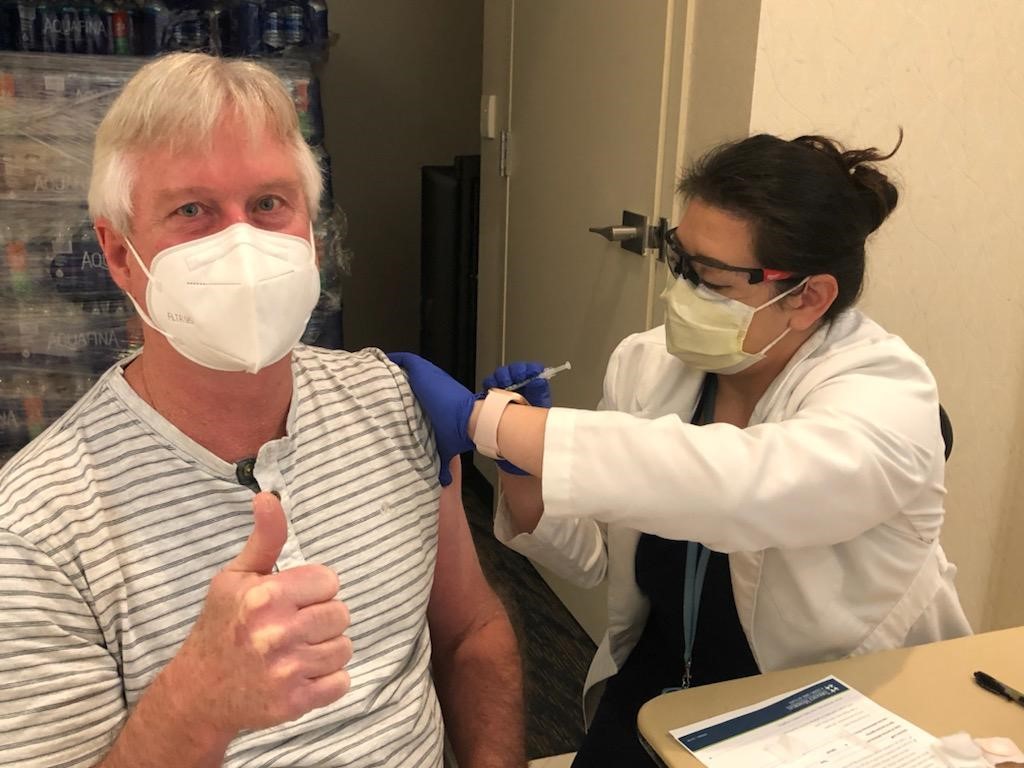By William Kim, M.D., Chief Medical Advisor, Beach Cities Health District
Earlier this week, Los Angeles County announced that over half of residents aged 16 and above have been vaccinated against COVID-19, an important milestone and evidence that vaccines are an important tool in the fight against the virus.
In L.A. County, just 11% of residents are estimated to be “vaccine-hesitant or unsure,” another important reason for the success in battling COVID-19. This number is lower than in many parts of the country, according to the Centers for Disease Control & Prevention (CDC).
For vaccine-hesitant people, the Los Angeles County Department of Public Health offers these comparisons: the risk of dying during a 200-mile car trip in California is about one in a million – but if someone told you they were taking you on an all-expenses-paid vacation to Monterey, you’d probably go. And the chances of getting food poisoning every year is 1 in 6, but we are still comfortable eating at a friend’s house or our favorite restaurant. Meanwhile, the risk of having a serious side effect from COVID-19 vaccination is about 1 in a million.
Those are pretty good odds for vaccinated people as California prepares to reopen its economy and relax most restrictions June 15.
These L.A. County numbers back this up: Among nearly four million fully vaccinated people, 933 people tested positive for a COVID-19 infection contracted more than two weeks after they were fully vaccinated. That means that about 0.03% of all vaccinated people tested positive for COVID-19. Of fully vaccinated people, 71 (0.002%) were hospitalized for infections contracted while fully vaccinated. And 12 people died of their infections, or 0.00036% of vaccinated County residents.
Nationally, the CDC reported Tuesday that more than 101 million persons in the U.S. had been fully vaccinated against COVID-19 from Jan. 1 – April 30, 2021. There were 10,262 breakthrough cases reported in that timeframe, or 0.00010% - roughly 1 in 10,000.
Of the 12 vaccinated county residents who died, Public Health found that four had severely weakened immune systems. This finding is a signal to people whose immune systems are suppressed may need to take additional steps to protect themselves in situations where COVID-19 and other respiratory viruses spread more easily, like wearing face masks, washing hands and maintaining physical distancing.
For healthy people, reopening the economy and relaxing restrictions doesn’t mean the pandemic is over, nor is our work done.
Why? There are a few reasons. For parents with young children who have not been vaccinated – the FDA has only approved vaccines for individuals aged 12 and older – keeping them safe includes continuing to wash hands, wear face masks and maintain physical distancing.
Another reason is no vaccine is 100% effective against illness. “Breakthrough cases” are possible, where a small percentage of people who are fully vaccinated get sick and could be hospitalized or even die from COVID-19. It’s also possible, according to the CDC, that some fully vaccinated people might have infections, but not have symptoms.
Breakthrough cases are rare, but expected
It’s important to keep in mind that vaccine breakthrough cases are expected. In some cases, a breakthrough illness may have been contracted before the patient was fully vaccinated, which takes effect two weeks after the final dose of vaccine was administered (2nd shot of Pfizer or Moderna; one dose of Johnson & Johnson).
COVID-19 vaccines are effective and are a critical tool to bring the pandemic under control. However, no vaccines are 100% effective at preventing illness. There will be a small percentage of people who are fully vaccinated who still get sick, are hospitalized or die from COVID-19.
According to the CDC, even though a small percentage of fully vaccinated people will get sick, vaccination will protect most people from getting sick. There also is evidence that vaccination may make illness less severe in people who get vaccinated but still get sick. But the overall risk of hospitalization and death among fully vaccinated people will be much lower than among people with similar risk factors who are not vaccinated.
And while there are side effects of the vaccine, including fever, a sore arm, fatigue, etc., the benefits of being vaccinated far outweigh the consequences of getting COVID-19, which to date has taken more than 587,000 lives in the U.S., according to the CDC.
CDC is working with state and local health departments to investigate COVID-19 vaccine breakthrough cases. The goal is to identify any unusual patterns, such as trends in age or sex, the vaccines involved, underlying health conditions, or which strain of the virus made people sick. To date, no unusual patterns have been detected in the data CDC has received.
Current data suggest that COVID-19 vaccines offer protection against most COVID-19 variants circulating in the United States. However, variants will cause some of these vaccine breakthrough cases, a primary reason to continue with the precautions mentioned above: wearing face masks, maintaining physical distance and washing hands.
What we’re doing in California is working. To join the millions of Californians who have been vaccinated, visit www.MyTurn.ca.gov to find a vaccine site near you.




